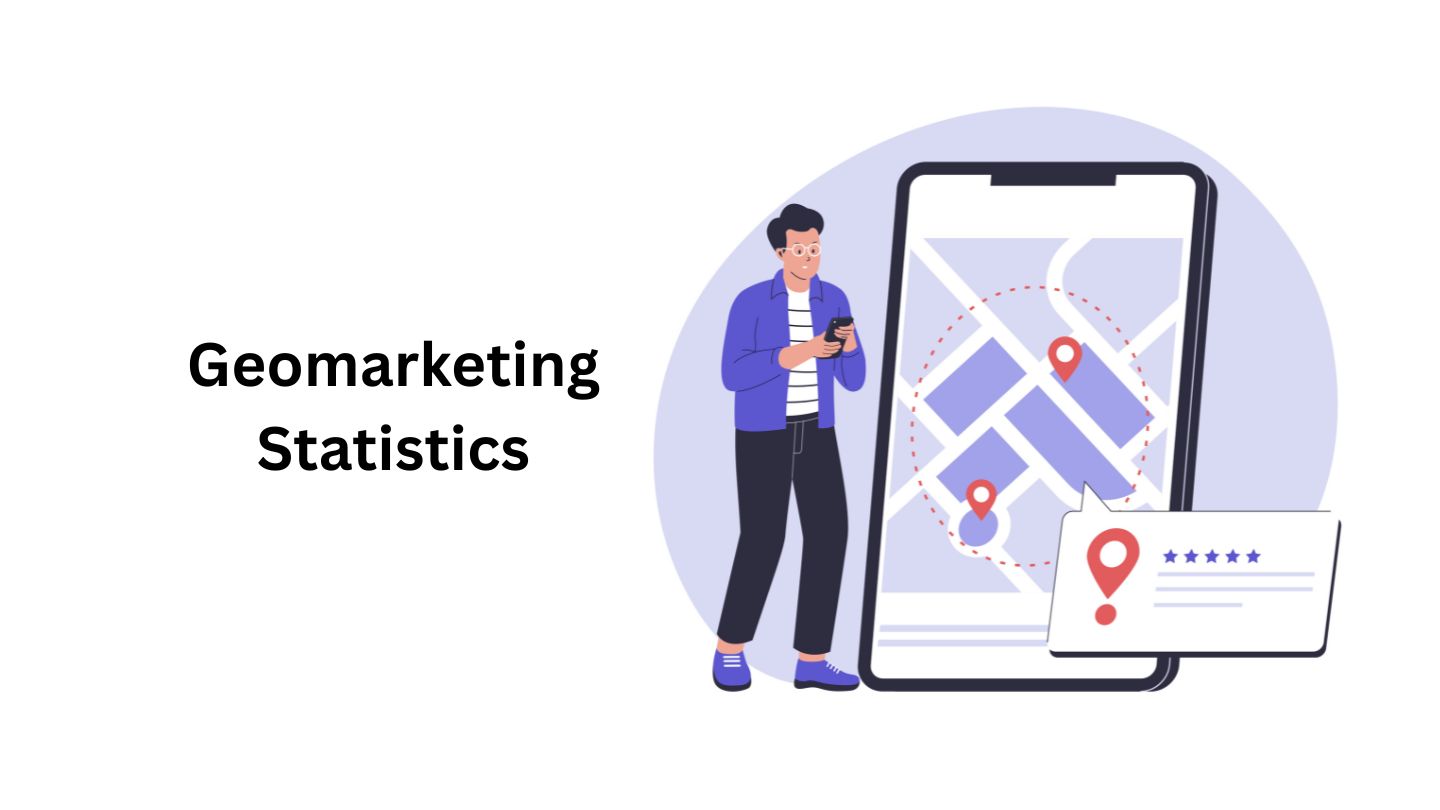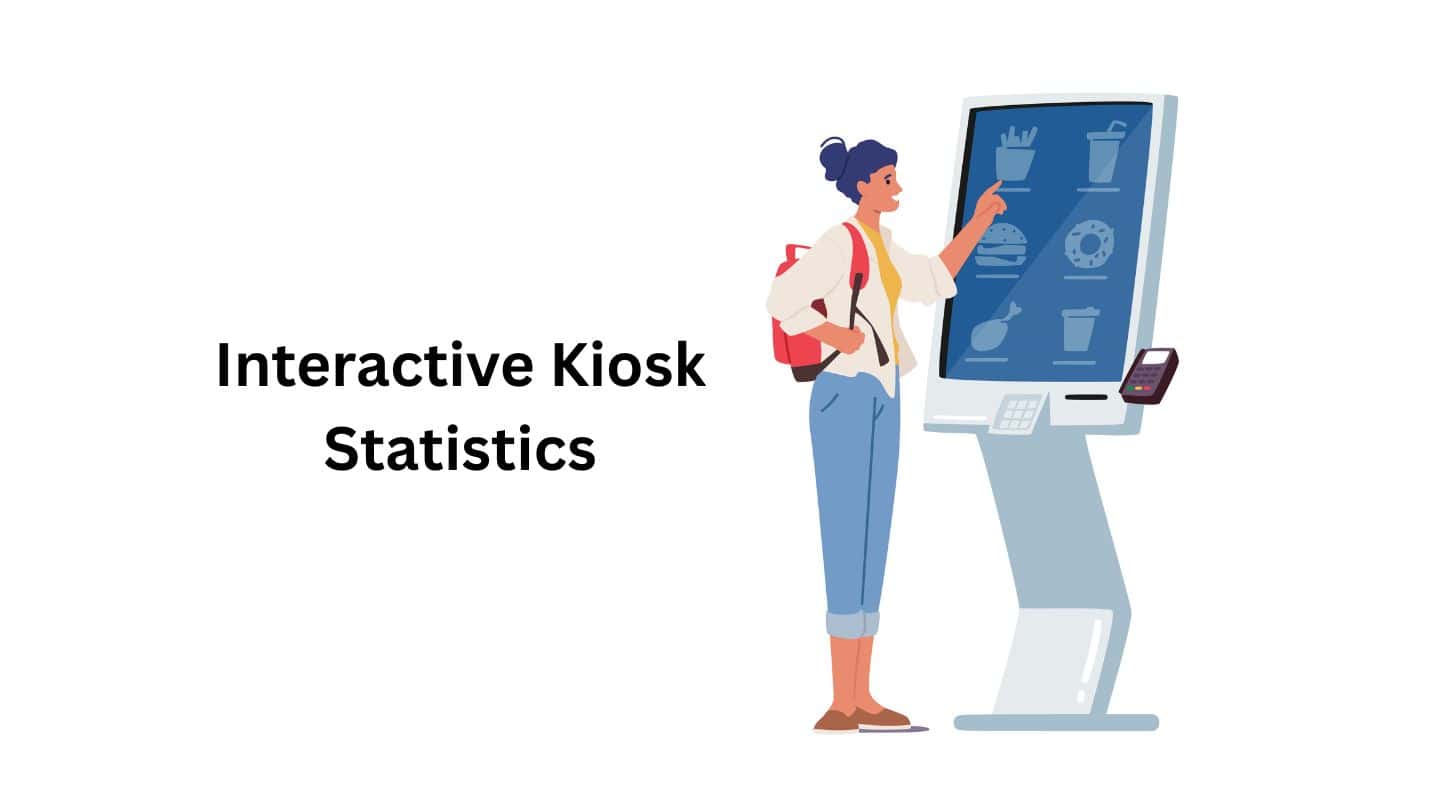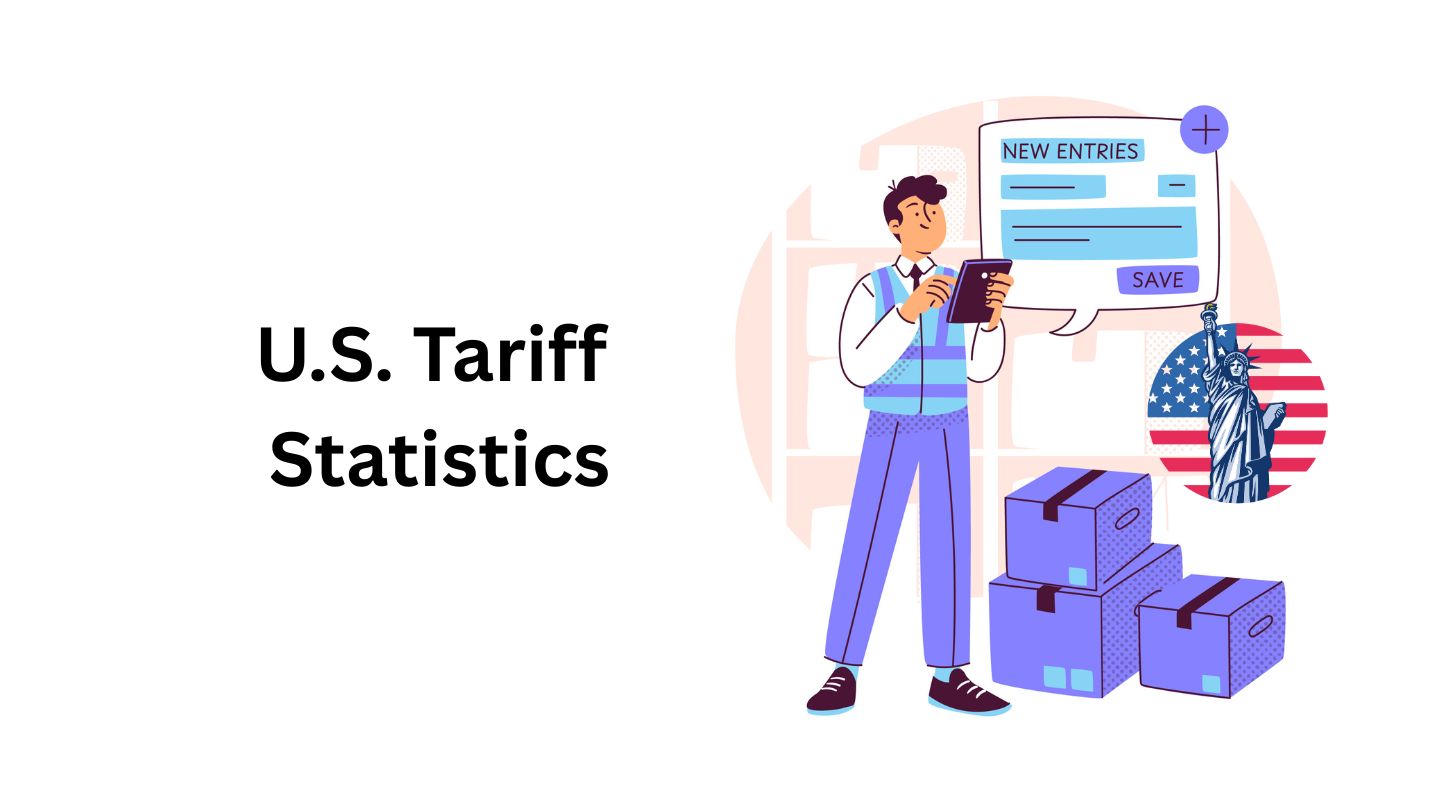Online Review Statistics By Attitude, Industry, Third-Party Rating, Reputation, Negative And Positive Reviews and Impact

Updated · Mar 05, 2025


TABLE OF CONTENTS
- Introduction
- Editor’s Choice
- Do People Read Online Reviews?
- General Online Reviews Statistics
- Attitude of Customers Towards Online Shopping
- Online Review Statistics by Industry
- Statistics on Third-Party Rating
- The Essential Aspect of Online Review
- Customer Trust in Lower Online Reviewed Companies
- Online Reputation Statistics
- Most Common Topics in Negative Reviews
- Most Common Topics in Positive Reviews
- Google Reviews Statistics
- Consumer Concentration While Reading Online Review Statistics
- Fake Online Review Statistics
- Buying Journey of Consumers over Online Review Statistics
- Tools to Earn Customer Trust
- Importance of Online Review for Business
- Responding Affects Brands
- The Impact of Online Reviews on Companies
- Product Review Statistics
- Conclusion
Introduction
Online Review Statistics: Online reviews are not only helpful for gaining exposure but also provide a chance to listen to your customers and put effort into building and protecting your brand. To help you navigate through customer complaints, we’ve put together a list of helpful Online Review Statistics.
A good review can make your products well-known, while a bad one can cost you customers and dollars. Staying updated with the latest trends in customer opinions will definitely help you create a stronger brand and better online presence.
Editor’s Choice
- 9 out of 10 customers check reviews before making a purchase.
- Online buyers read at least four reviews before deciding to buy a product.
- Around 47% of customers leave reviews every month.
- A survey found that 63% of customers never get a response from the company after posting a review.
- Online Review Statistics stated that almost 58% of customers would spend more or travel farther to visit places with good reviews.
- 59% of consumers expect a reply within 30 minutes when they have questions about a product or service.
- Reviews lead to an average 18% increase in sales.
- A purchase is more likely if the product rating is between 4.0 and 4.7.
- Nearly 30% of online reviews are fake, and consumers often can’t tell the difference.
- 89% of people aged 18-34 have noticed a fake review, more than any other age group.
- 71% of people say negative reviews are just as important as positive ones when making buying decisions.
- The average review in 2022 had about 200 characters.
- 89% of consumers look at a company’s responses to reviews.
- Products with reviews on the page have conversion rates that are 3.5 times higher.
- Customers say they are willing to pay 31% more for a product with great reviews.
- 94% of customers avoid a business after seeing negative reviews.
- Just one review on your product page can increase conversion rates by 354%.
- 43% of people prefer written reviews over photos or videos.
- Online Review Statistics stated that nearly 89% of customers around the world read reviews before making a purchase.
- Roughly 48% of consumers visit a company’s website after reading good reviews.
- 72% of travelers always check reviews when deciding where to stay, eat, or what to do.
- 62% of consumers disagree with blocking negative reviews.
- Online Review Statistics stated that almost 47% of consumers think companies use fake reviews to improve their image.
You May Also Like To Read
- SEO Statistics
- Landing Page Statistics
- SSL Statistics
- Web Design Statistics
- Content Marketing Statistics
- TLD Statistics
- Conversion Rate Optimization Statistics
- Web Hosting Statistics
- B2B Marketing Statistics
- Node.js Statistics
- Affiliate Marketing Statistics
- UX Statistics
- Digital Marketing Statistics
Do People Read Online Reviews?
- 95% of people have used online reviews at least once, according to Online Review Statistics.
- Online Review Statistics stated that nearly 97% of shoppers prefer reviews that are longer and give more details, according to Online Review Statistics.
- G2 asked if people are more likely to buy a B2B product or service after reading a trusted review. About 92% of people said yes.
- 55% of consumers are less likely to buy a new product if it only has star ratings and no written reviews. They want more information about the product and how it performs.
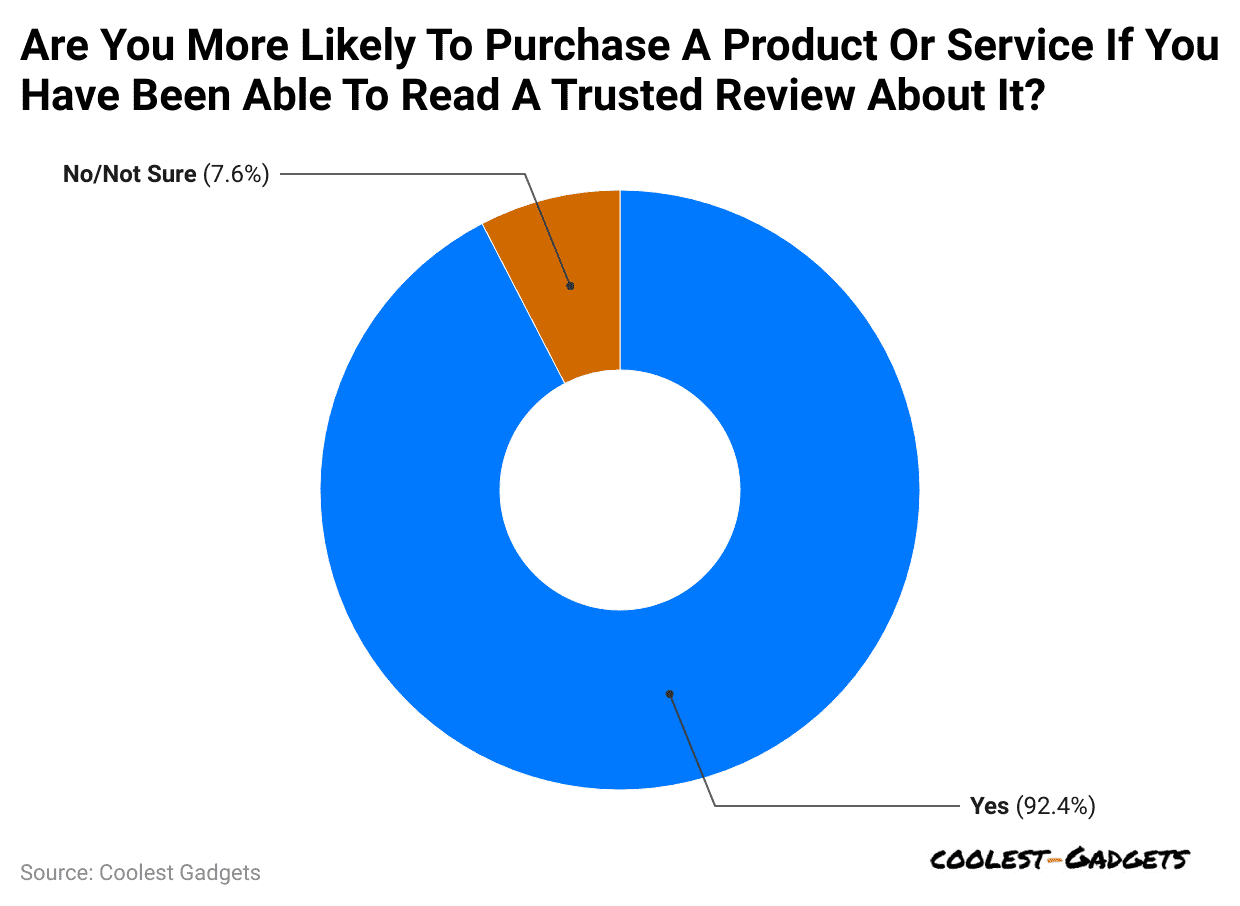 (Reference: reviewflowz.com)
(Reference: reviewflowz.com)
- Online Review Statistics stated that almost 71% of B2B buyers read reviews during the “consideration” phase before making a purchase. These reviews have a big impact on whether they decide to click “buy.”
- 7% of shoppers read between 1 and 10 reviews on a product before deciding to buy.
- Reviews aren’t just important for B2B or online services. A YouGov survey found that 32% of global customers check reviews before buying household products.
- This number is even higher in countries like Indonesia and Singapore, where it’s 43%.
General Online Reviews Statistics
- Nearly 90% of people read online reviews before visiting a business.
- 88% of people trust online reviews as much as personal recommendations.
- Almost 86% of people are hesitant to buy from businesses with bad reviews.
- 74% of people say positive reviews make them trust a local business more.
- Customers are willing to spend 31% more on a business with great reviews.
- Online Review Statistics stated that nearly 72% of consumers only take action after reading a positive review.
- 92% of people will choose a local business with at least a 4-star rating.
- Around 72% of people believe responding to reviews shows a company cares about its customers.
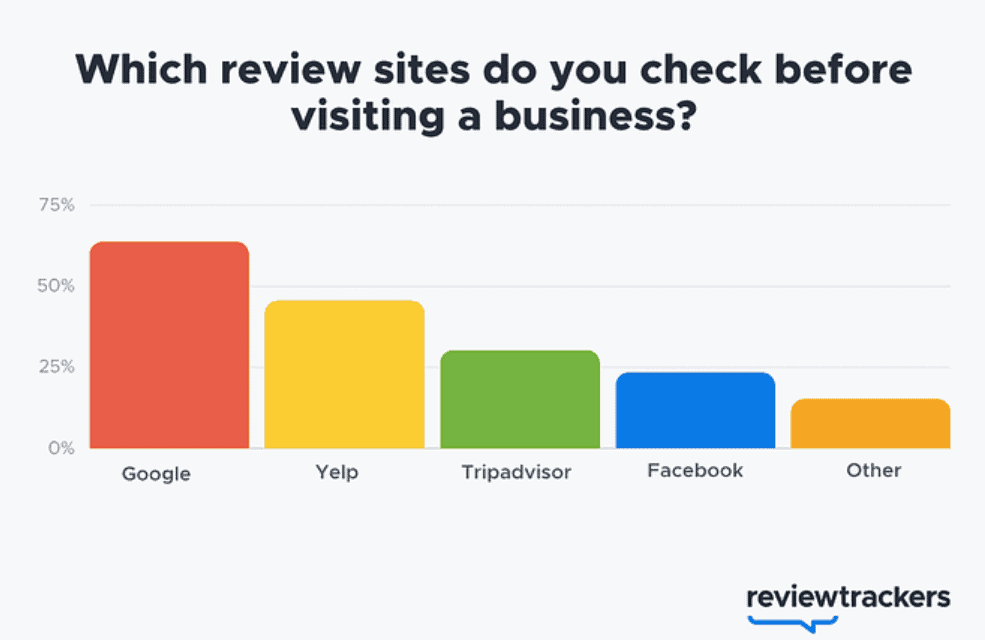 (Source: hookagency.com)
(Source: hookagency.com)
- A bad review can drive away about 94% of customers.
- 80% of people feel that businesses care more when management responds to reviews.
- Responding to reviews can lead to a 12% increase in revenue.
- 52% of people expect a reply within 7 days of their review.
- Nearly 53% of customers expect businesses to reply to negative reviews within a week.
- Online Review Statistics stated that almost 45% of people are more likely to visit a business that answers negative reviews.
- On average, people read 10 reviews before trusting a business.
- Every extra star in a rating can boost revenue by 5-9%.
- 68% of people look at the number or quality of reviews before forming an opinion about a local business.
- A business can lose up to 22% of customers if a single negative article is found online.
- 64% of people check reviews on Google before visiting a business, more than any other site.
- Nearly 60% of people check online reviews at least once a week.
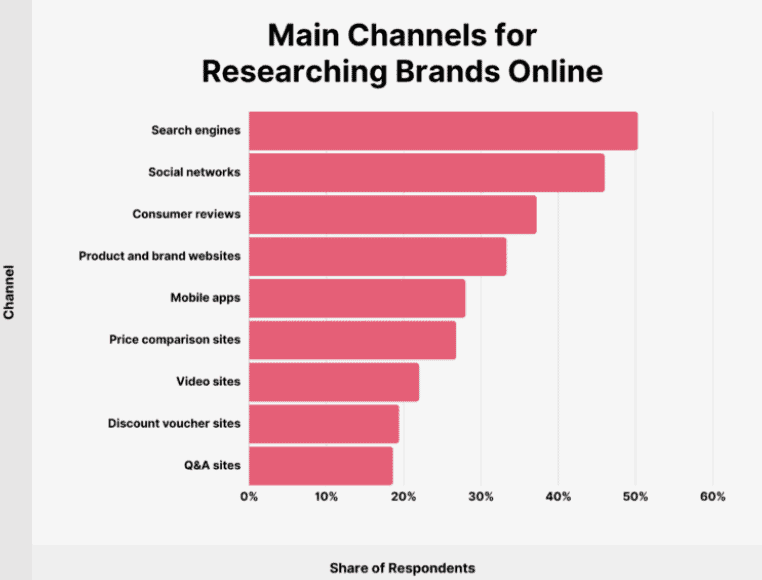 (Source: backlinko.com)
(Source: backlinko.com)
- Three bad reviews can cut sales by up to 59%.
- Customers may pay up to 31% more for a business with excellent reviews.
- Around 57% of people will only use a business with four or more stars.
- Yelp and Facebook are the second and third most trusted review sites after Google.
- Online Review Statistics stated that nearly 40% of people form an opinion after reading just 1-3 reviews.
- Mobile apps with ratings under three stars are less likely to be downloaded.
- Almost 91% of millennials trust online reviews as much as personal recommendations.
- About 50% of customers often or always check reviews but rarely leave them.
Attitude of Customers Towards Online Shopping
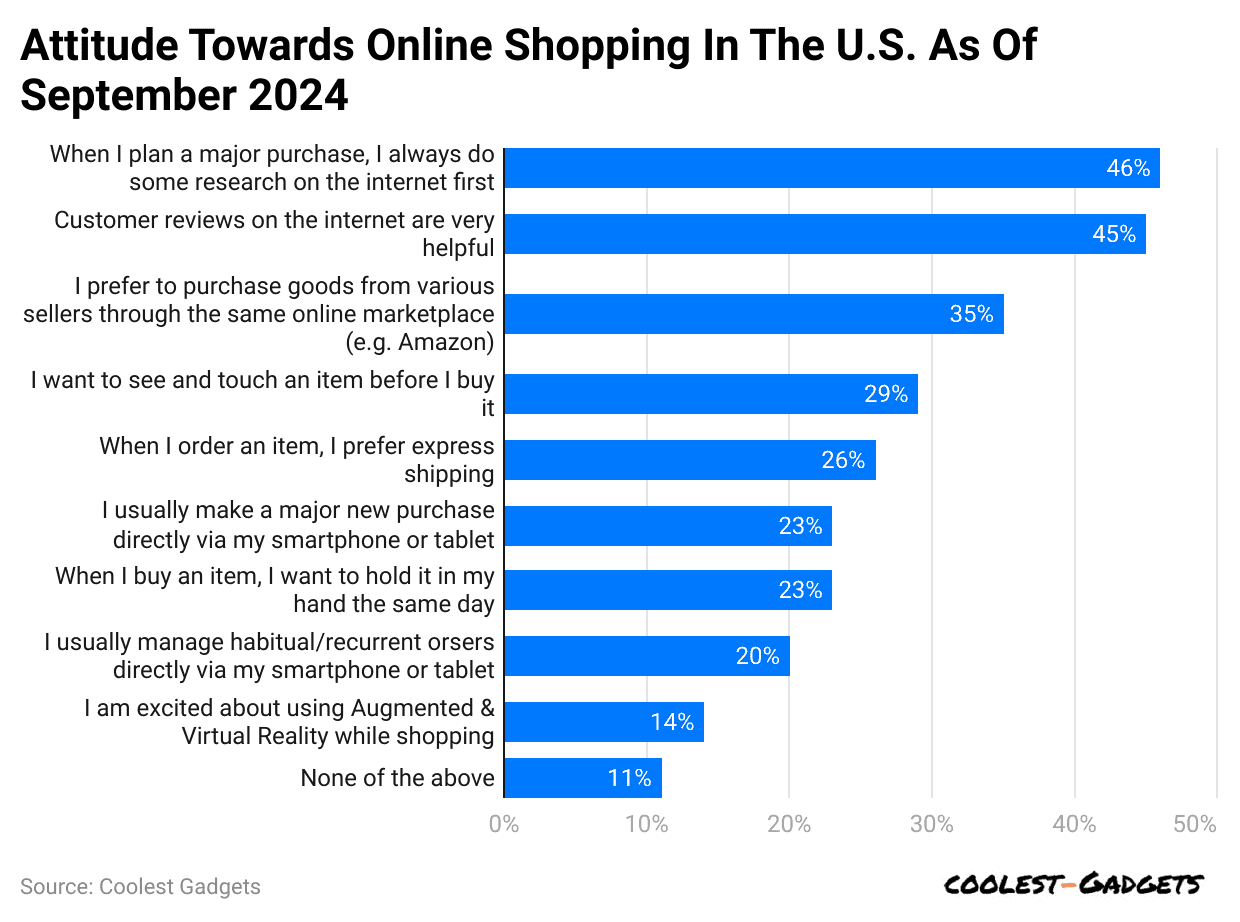 (Reference: electroiq.com)
(Reference: electroiq.com)
| When I plan a major purchase, I always do some research on the internet first | 46% |
| Customer reviews on the internet are very helpful |
45% |
|
I prefer to purchase goods from various sellers through the same online marketplace (e.g. Amazon) |
35% |
| I want to see and touch an item before I buy it |
29% |
|
When I order an item, I prefer express shipping |
26% |
| I usually make a major new purchase directly via my smartphone or tablet |
23% |
|
When I buy an item, I want to hold it in my hand the same day |
23% |
| I usually manage habitual/recurrent orsers directly via my smartphone or tablet |
20% |
|
I am excited about using Augmented & Virtual Reality while shopping |
14% |
| None of the above |
11% |
- Online review statistics show that U.S. consumers prefer to do research and read reviews before making large online purchases, with convenience and trust being key factors.
- 46% of consumers always research online before making a big purchase.
- Nearly 45% find customer reviews helpful when making decisions.
- Online Review Statistics stated that nearly 35% prefer shopping on trusted marketplaces.
- Online Review Statistics stated that almost 26% like having the option for fast shipping.
- 23% use mobile devices for big purchases, and another 23% want same-day delivery.
- Only 14% are interested in using augmented reality experiences.
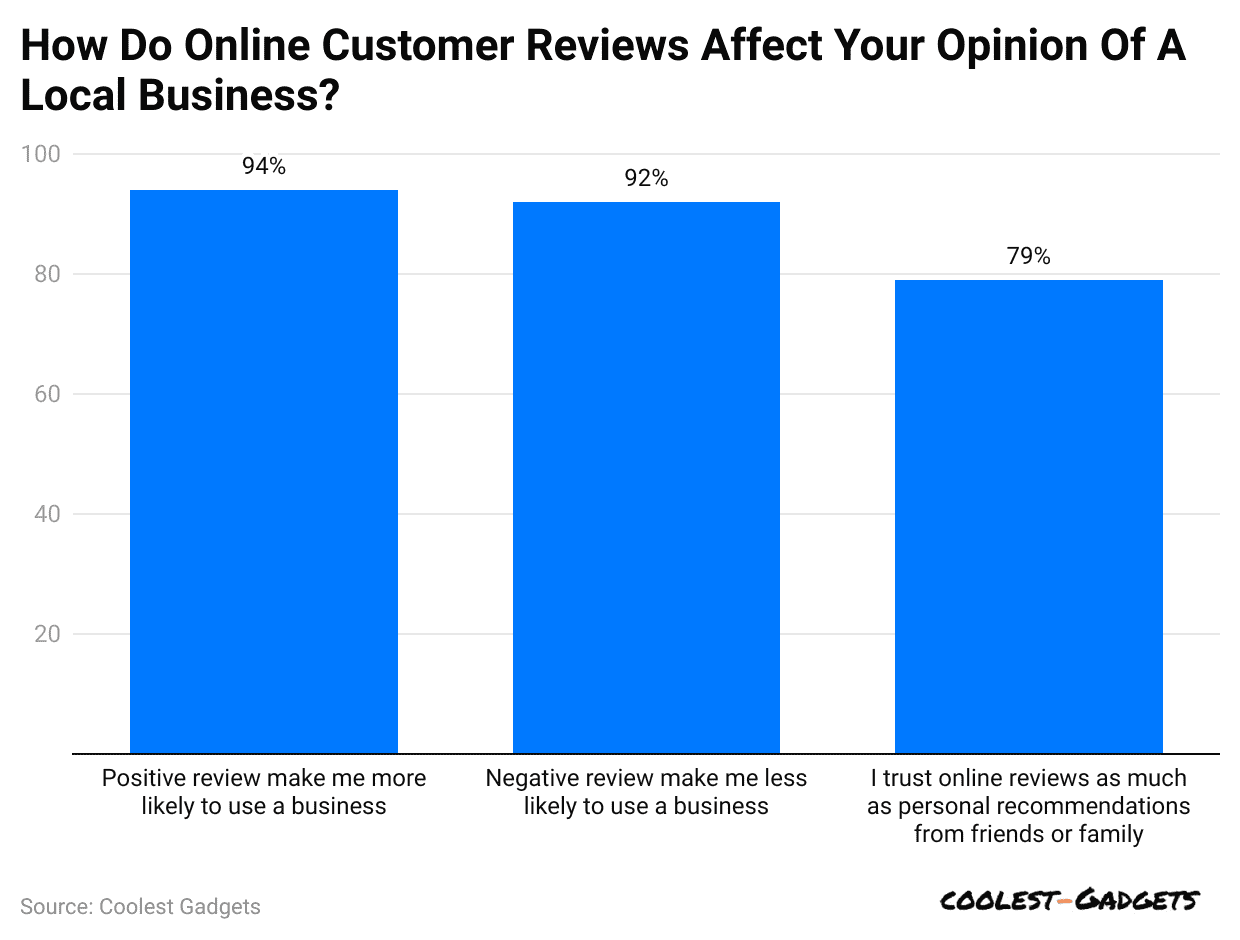 (Reference: statista.com)
(Reference: statista.com)
- In a December 2023 survey of U.S. online shoppers, 94% of people said they were more likely to use a business with positive reviews.
- On the other hand, 92% said they would avoid a local business if it had negative reviews.
Online Review Statistics by Industry
- 82% of people read reviews before visiting local small businesses.
- Reviews are 2x more important than customer loyalty and 7x more important than traditional advertising when picking a local small business.
- 87% of people say the quality of service is the most important factor in reviews for service businesses, and 78% say price is just as important.
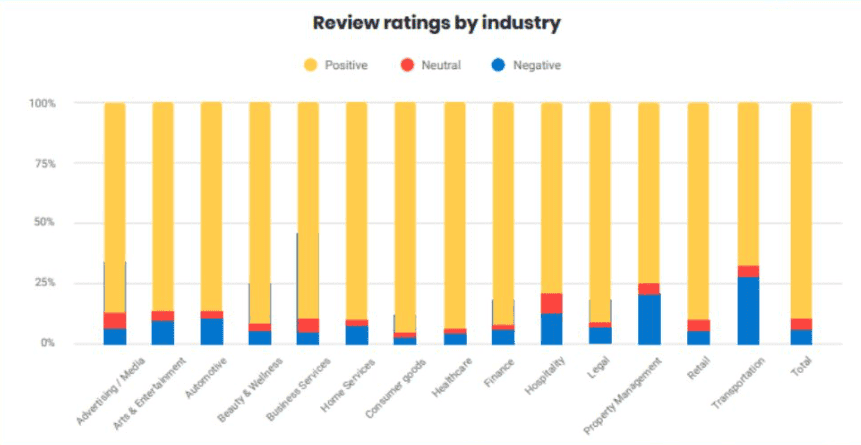 (Source: birdeye.com)
(Source: birdeye.com)
- Displaying reviews on product pages increases conversions by about 5x.
- Online Review Statistics stated that almost 98% of B2B buyers look at reviews before choosing software.
- Product reviews are trusted 12 times more than the product description from the manufacturer.
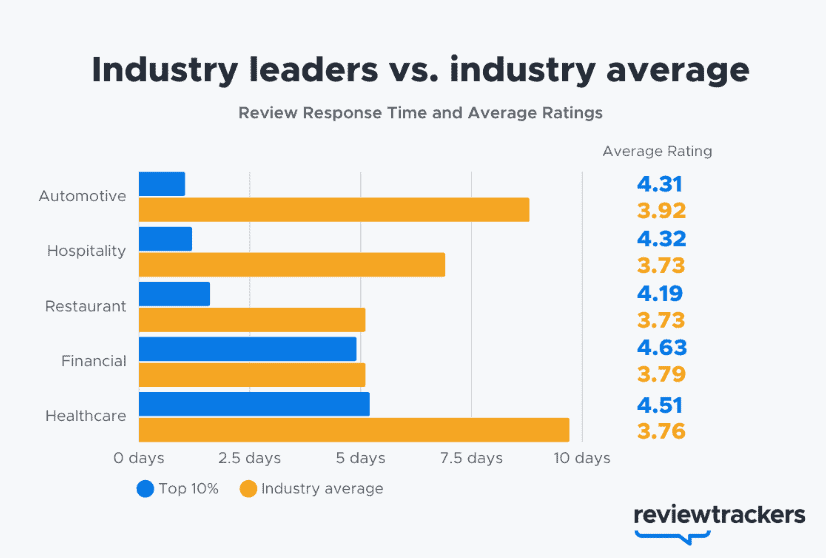 (Source: reviewtrackers.com)
(Source: reviewtrackers.com)
-
Healthcare
#1. 49% of potential patients check reviews on Google, and 32% use WebMD.
#2. 59% of people say online reviews play a key role in choosing a doctor or healthcare provider.
-
Personal Services
#1. 36% of people check reviews when choosing a salon, and 25% also read reviews from other professionals in the field.
#2. 91% of event planners measure event success based on guest reviews.
-
Automotive
#1. High prices and poor performance are the main reasons for bad reviews of auto repair shops.
#2. 80% of reviews for auto retailers are on Google.
#3. 46% of car buyers use multiple devices to read reviews.
-
Restaurants
#1. 70% of customers are willing to leave a review if a server or manager asks.
#2. 59% of people read reviews when picking a restaurant.
-
Lawyers
#1. Nearly 60% of people check reviews before hiring a lawyer, and only 19% of millennials would consider a lawyer with no reviews.
#2. 90% of people would still hire a lawyer with mostly positive reviews, even if there were one negative review.
-
Travel and Hospitality
#1. Business travelers read an average of 5 reviews, while leisure travelers read 6 to 7.
#2. 78% of travelers pay attention to the most recent reviews.
-
Real Estate
#1. 96% of people trust online reviews when selecting a residential service provider.
#2. 51% of renters expect property management to respond to all reviews.
-
Recruitment and Hiring
#1. Companies with bad reviews spend 10% more per hire.
#2. 57% of job seekers avoid companies with negative reviews.
Statistics on Third-Party Rating
- More than half of consumers check Yelp reviews before making a decision.
- Online Review Statistics stated that Yelp gets 26,830 new reviews every minute on average.
- Where do people go to read reviews? The most popular sites are Amazon (95%), retailer websites (93%), brand websites (68%), and search engines (65%).
- Google, Facebook, and Yelp are other top places for reviews, and their use stays about the same each year.
- If a business improves its rating by one star on Yelp (for example, from 3 to 4 stars), its revenue can increase by 5-9%.
- A one-star increase in a product’s rating on Amazon can boost sales by up to 26%.
- Amazon stopped allowing incentivized reviews in October 2016. Sellers can’t offer free products, discounts, or money for positive reviews. Reviews must be real.
- Sellers are also not allowed to ask for positive reviews directly; they can only request a neutral review.
- Only 1-2% of Amazon shoppers leave reviews, which shows how important it is to ask customers for reviews to get noticed.
The Essential Aspect of Online Review
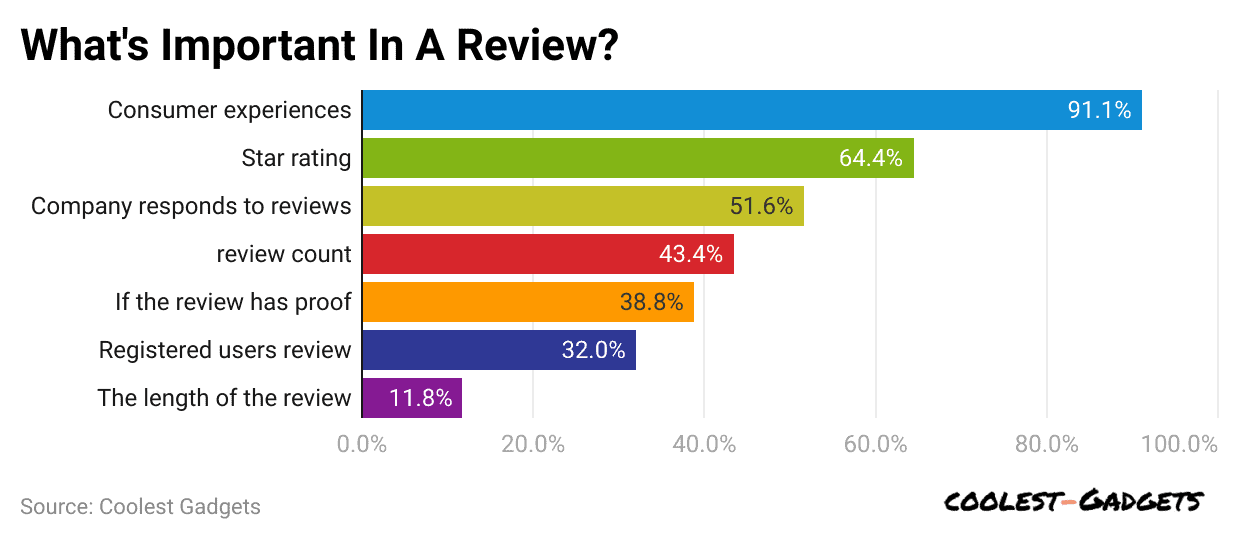 (Reference: electroiq.com)
(Reference: electroiq.com)
- Online review statistics show that consumers focus on real, personal experiences in reviews, with star ratings and company responses also being important.
- 1% of people say that personal experiences are the most important part of a review.
- Online Review Statistics stated that almost 64.4% of consumers care about star ratings, as they provide quick and easy feedback.
- 6% of people like it when companies reply to reviews, showing that engagement matters.
- The total number of reviews influences 4% of consumers, highlighting that more reviews can make a business seem more trustworthy.
- 8% of people prefer reviews that offer proof, such as verified information.
- Reviews from registered users matter to 32% of consumers.
- The length of a review is the least important factor, with just 11.8% of people giving it much attention.
Customer Trust in Lower Online Reviewed Companies
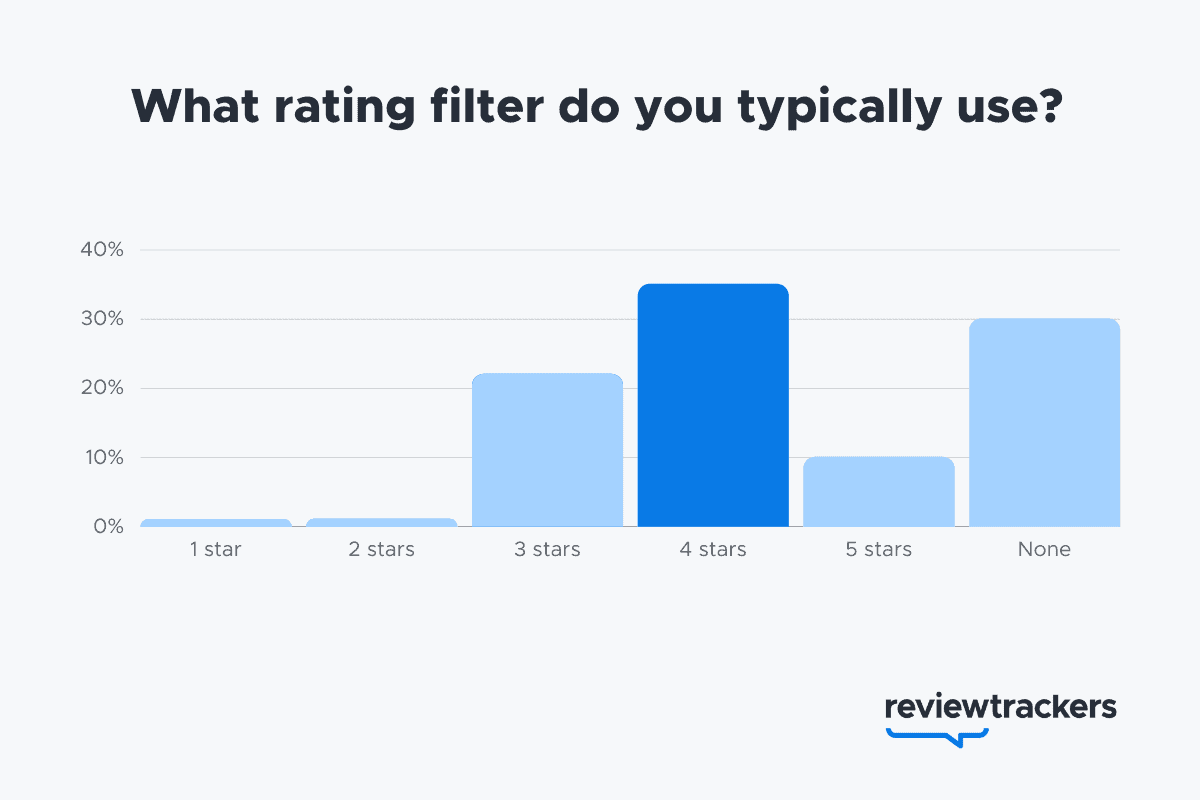 (Source: reviewtrackers.com)
(Source: reviewtrackers.com)
- The previous section shows how ratings are still very important for brands to stand out.
- Since the pandemic, 70% of consumers say they use rating filters when looking for businesses.
- The most common filter people use is to see only businesses with four stars or more. If your business has less than a 4-star average, you might be missed by many potential customers.
- It’s also important to know that customers prefer honest, real feedback, which means that imperfect reviews matter, too.
- While you should aim for five stars, understand that not-perfect reviews still help consumers make their decisions.
Online Reputation Statistics
- Online Review Statistics stated that nearly 72% of people say they trust a local business more if it has positive reviews. Reviews are a great way to build a business’s reputation online.
- 95% of shoppers read reviews before buying. 83% of people think reviews are most helpful if they are recent and relevant.
- 67% won’t trust a high rating unless it has a lot of reviews backing it up.
- Since the pandemic, 31% of shoppers are reading more reviews. 57% of U.S. shoppers say reviews help them make decisions, but they only matter if they are honest, up-to-date, and relevant.
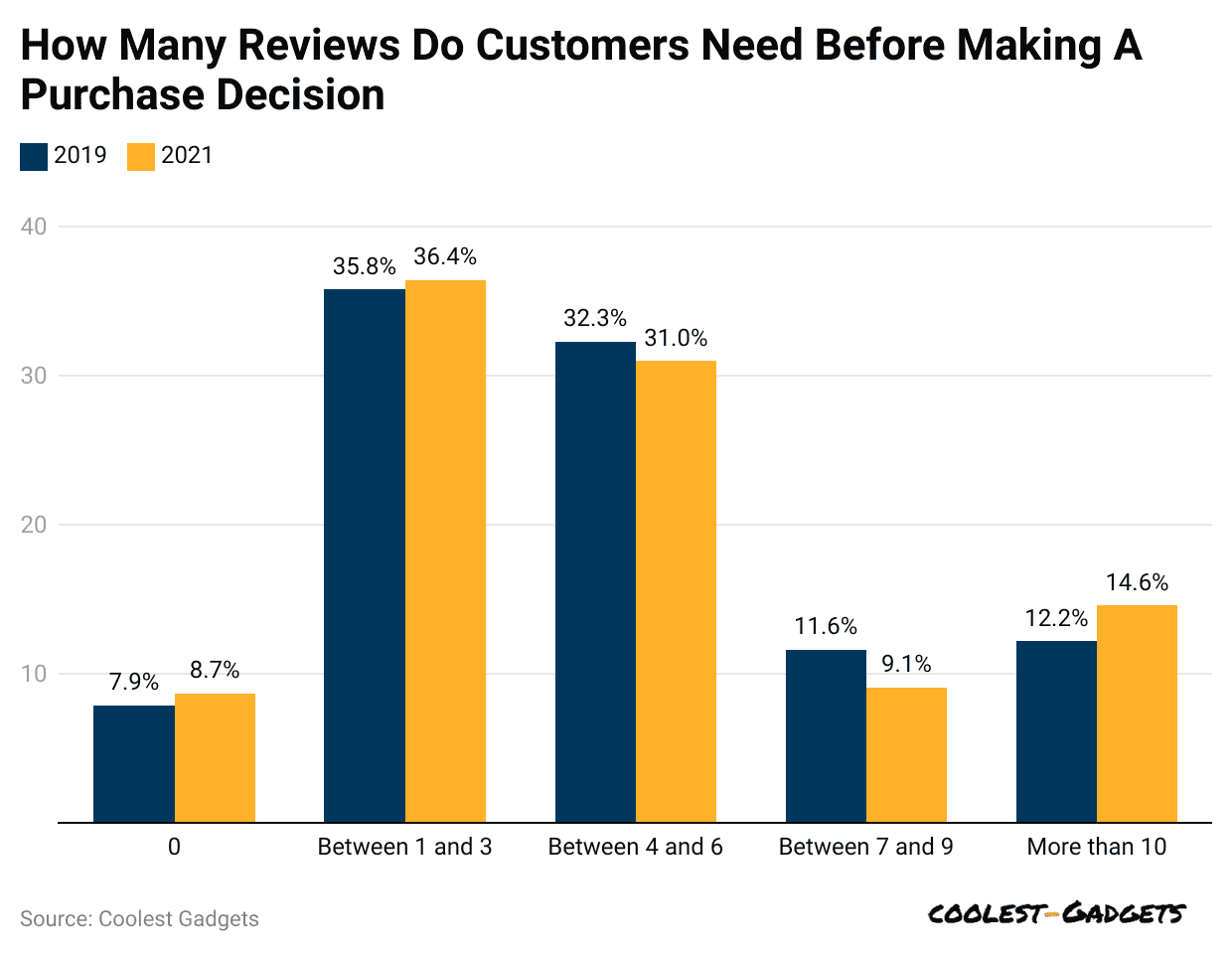 (Reference: truelist.com)
(Reference: truelist.com)
- 93% of people read reviews before buying a product.
- With over 84% of millennials ignoring traditional ads, 9 out of 10 people read online reviews before buying something online.
- Reviews with pictures from real customers help shoppers feel more comfortable.
- Online Review Statistics stated that almost 49% of consumers trust reviews as much as personal recommendations. 37% trust reviews as much as advice from social media influencers.
- 62% of consumers won’t support businesses that hide negative reviews. Customers expect transparency from companies.
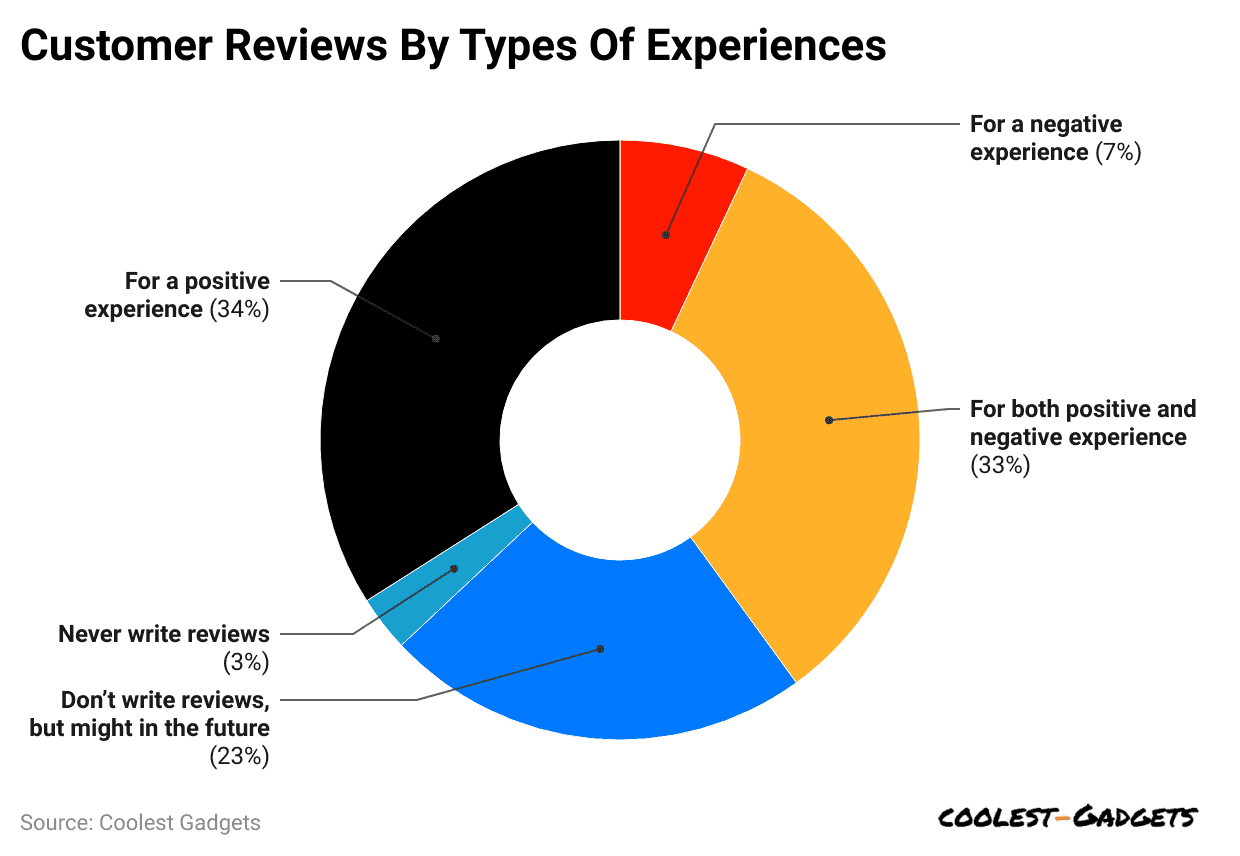 (Reference: truelist.co)
(Reference: truelist.co)
- 60% of shoppers care about the number of reviews. The more reviews a business has, the more consumers trust it. However, this has slightly decreased since 2020.
- Around 75% of people leave reviews to help businesses improve. 34% leave reviews when they are happy with the experience, while 7% leave reviews when they have a bad experience.
- 7% of buyers trust third-party review sites like Yelp. 16.6% fully trust these sites, while 7.9% need to trust the reviewer before they believe a review.
- 58% of shoppers are willing to pay more or travel farther to go to a business with good reviews.
- Online Review Statistics stated that around 41% of people say reviews are a key factor when choosing a local business.
- More than 50% of internet users leave reviews every month. People between the ages of 25-34 are the most likely to post reviews, with 53% of them doing so.
Most Common Topics in Negative Reviews
- This means that we looked at all the 1- and 2-star reviews in our database and compared them to find common issues and topics mentioned in negative reviews.
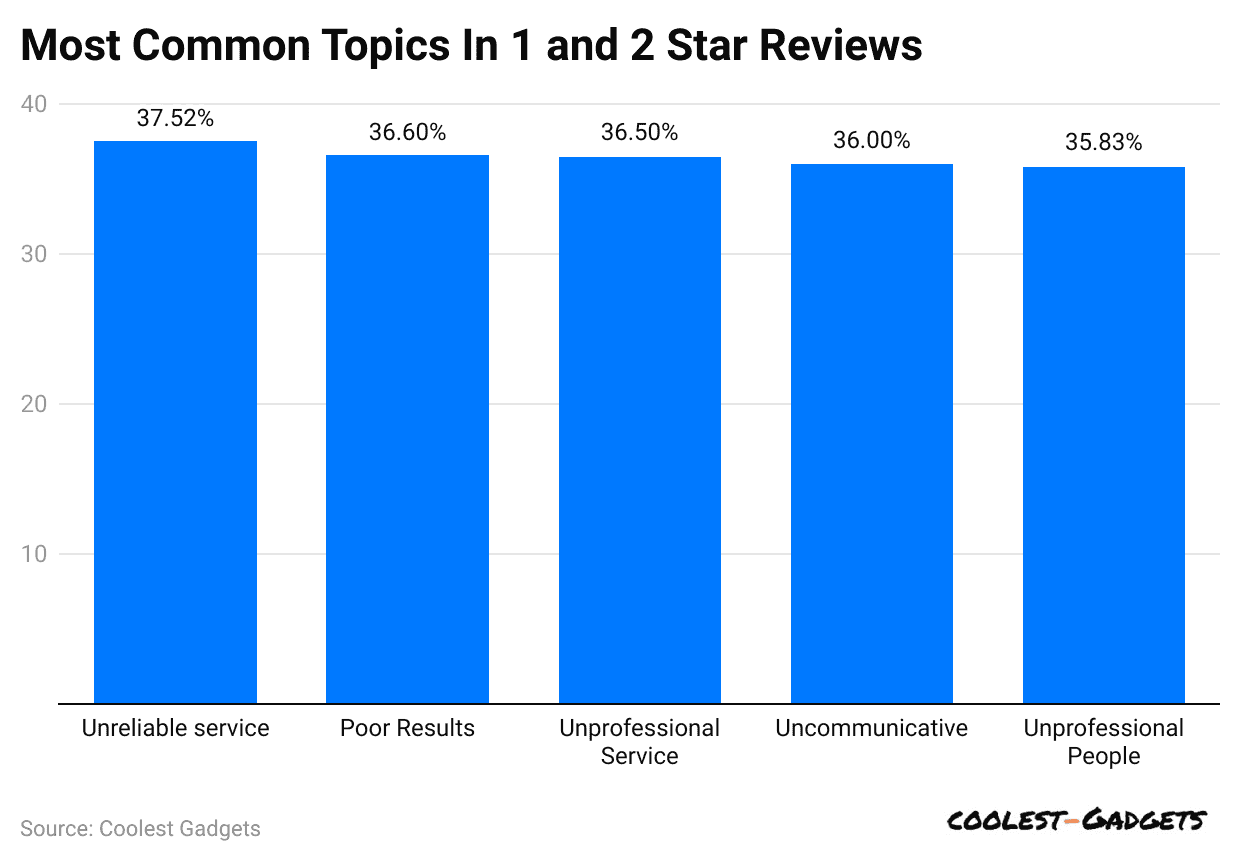 (Reference: nicejob.com)
(Reference: nicejob.com)
- The main reason customers leave negative reviews is unreliable service, which is mentioned in 37.52% of bad reviews.
- Other common complaints include poor results (36.60%), unprofessional service (36.50%), lack of communication (36.00%), and unprofessional staff (35.83%).
- Issues like limited experience (31.57%), slow responses (29.83%), dishonesty (29.72%), high prices (28.51%), and difficulty reaching the business (23.87%) are less frequent.
- This shows that customers care most about professionalism and quality service.
Most Common Topics in Positive Reviews
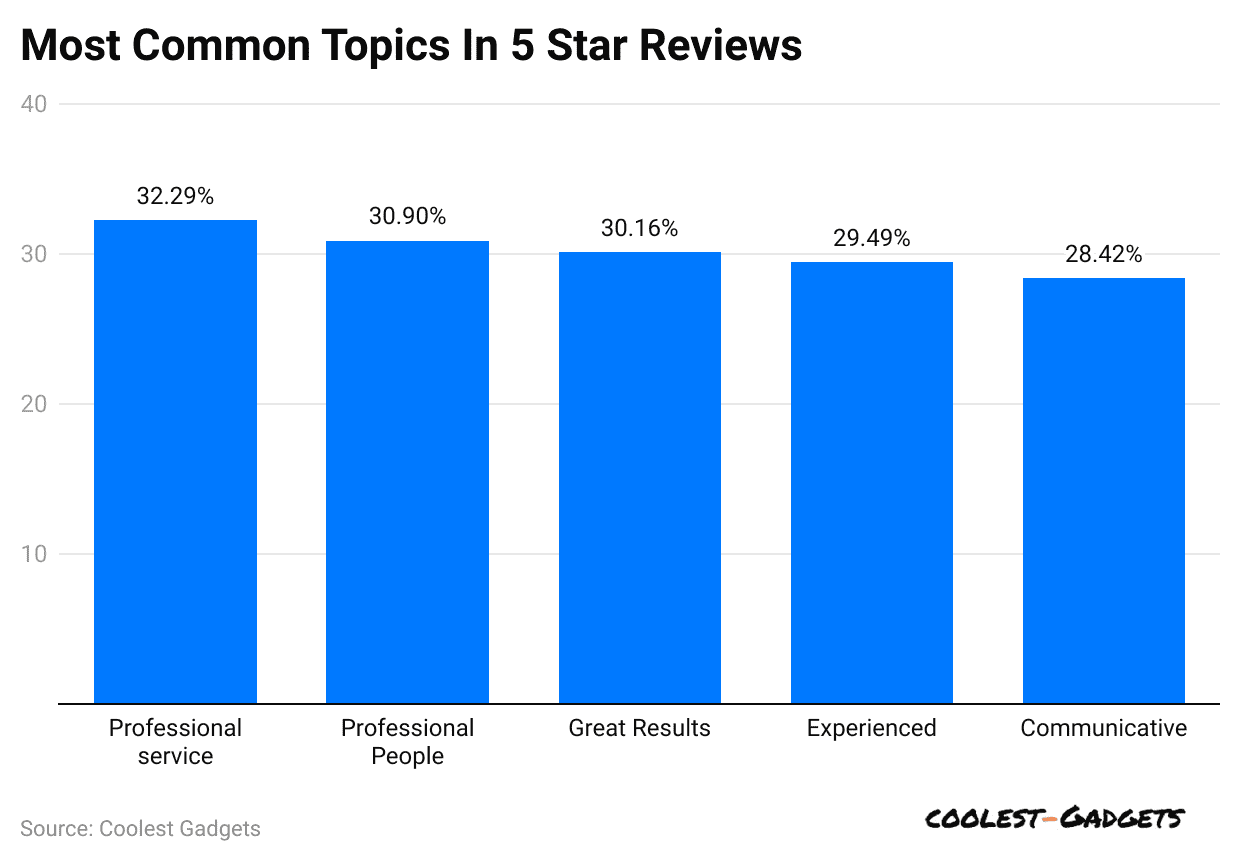 (Reference: nicejob.com)
(Reference: nicejob.com)
- In 32.29% of 5-star reviews, customers mention professional service, followed by compliments for professional staff (30.90%), great results (30.16%), experience (29.49%), and good communication (28.42%).
- Other factors that weren’t as common in reviews include fast service (25.50%), affordability (20.96%), being easy to contact (19.67%), and punctuality (18.00%).
- This shows that customers care more about professionalism and reliability than things like price, speed, or how easy it is to reach someone.
Google Reviews Statistics
- Online Review Statistics stated that almost 95% of people today check online reviews before buying a product or service.
- Google is the most popular site for reviews, with 73% of all reviews being found there, making it the first place consumers go for social proof before making a purchase.
- 53% of customers expect businesses to respond to negative reviews within a week.
- Studies show that customers are willing to spend 31% more on products or services that have great reviews.
- When looking for reviews, 81% of consumers use Google first, with Facebook coming in second at 45%.
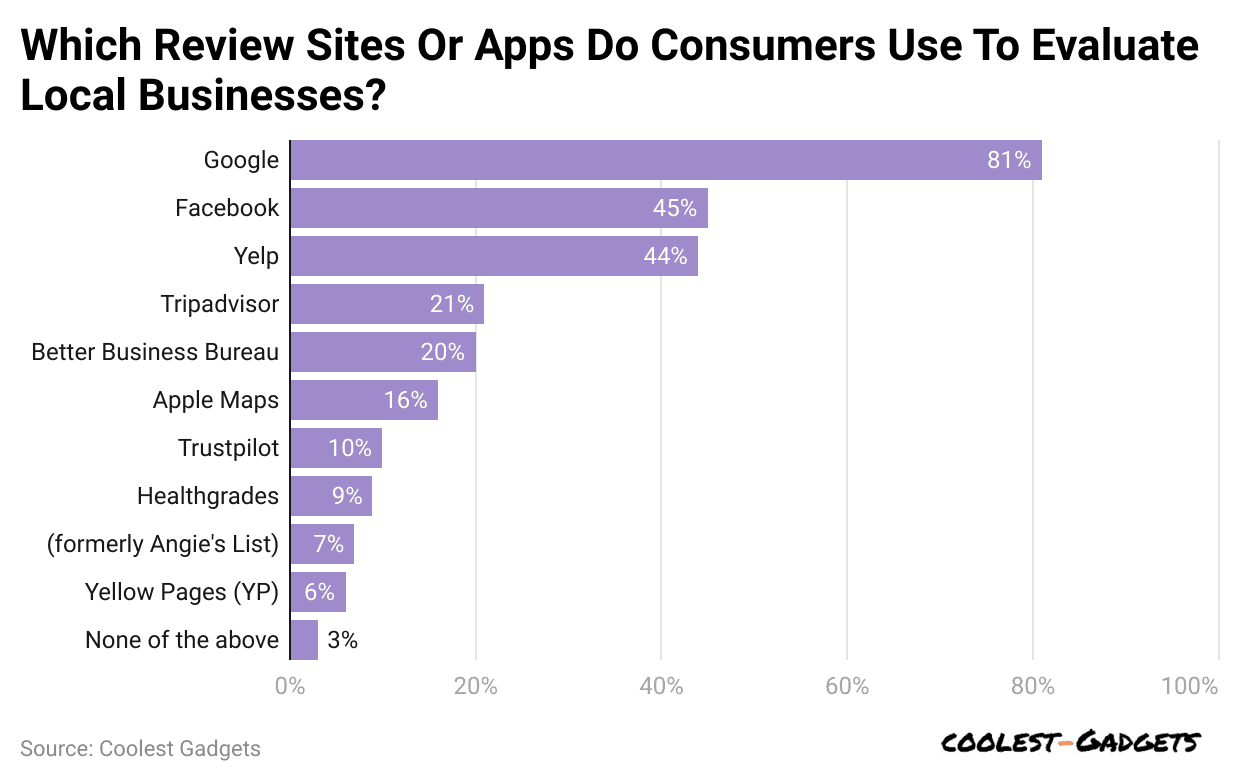 (Reference: embedsocial.com)
(Reference: embedsocial.com)
- 34% of all Google reviews are related to businesses in the healthcare sector.
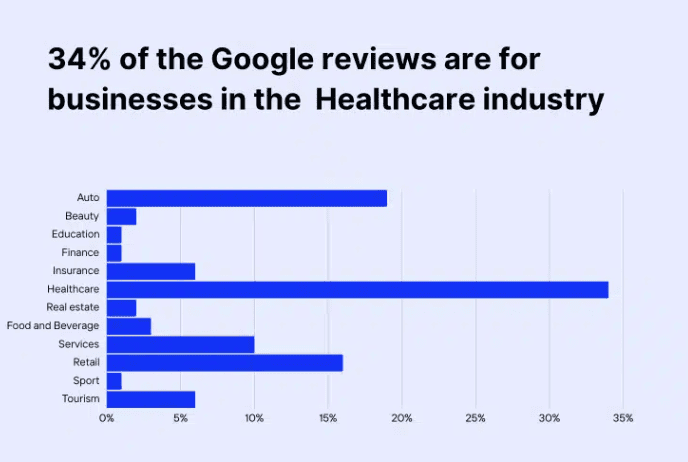 (Source: embedsocial.com)
(Source: embedsocial.com)
- In 2023, most Google reviews were written in August, making up more than 10% of the total for the year, while February had the fewest reviews, with less than 6%.
- Out of the Google reviews analyzed, 75% included text, which makes these reviews more helpful by providing detailed feedback. Among the 1-star reviews, 88% also had written comments.
- Online Review Statistics stated that out of 1 million Google reviews, 86% were 5-star ratings, while only 4% (44,107 reviews) were 1-star ratings.
- Data from 2023 and 2024 shows that 69% of consumers are likely to leave a review if the business asks them to. Additionally, 19% of people said they always leave a review, even if they are not asked.
- Most customers expect a business to have between 20 and 99 reviews, with 59% of consumers agreeing with this.
- Only 24% of people would consider doing business with a company that has a 3-star rating, but this jumps to 54% for businesses with a 4-star rating.
- These numbers suggest that businesses should aim to have at least a 4-star rating on their Google Business Profile to keep customers coming back.
- Hair salons top the list, making up 11.68% of all reviews. This shows that the personal nature of the service encourages more customers to leave feedback.
- X-ray labs come next, with 10.78% of reviews. The technical and important nature of their services likely drives more patients to leave reviews based on their experiences.
- Appliance stores take third place with 10.72% of reviews. Since these are big purchases that impact daily life, customers are more likely to share their opinions.
- Finally, products with five reviews are 270% more likely to be purchased than products with no reviews.
Consumer Concentration While Reading Online Review Statistics
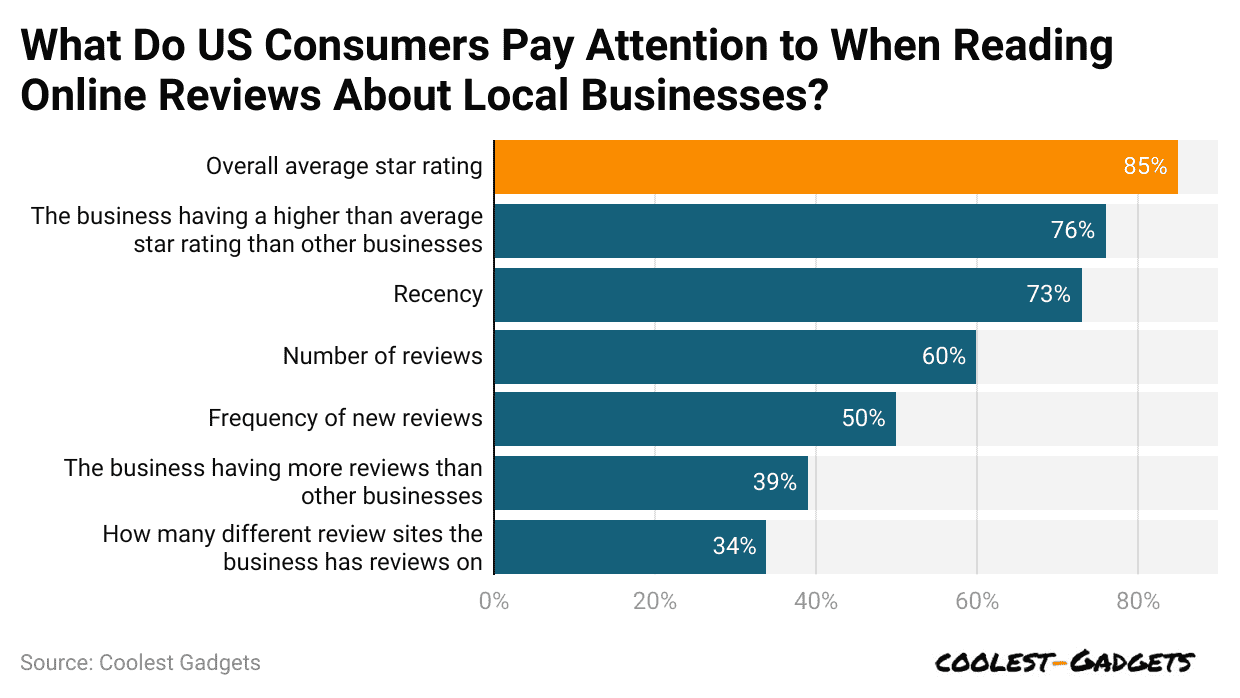 (Reference: enterpriseappstoday.com)
(Reference: enterpriseappstoday.com)
The graph above shows how people in the U.S. use online reviews to choose local businesses:
- 85% of customers base their decisions on the average star rating.
- Nearly 76% of customers prefer businesses with higher star ratings than others.
- Almost 73% of customers pay attention to how recent the reviews are.
- Online Review Statistics stated that roughly 60% of customers look at the number of reviews before making a choice.
- 50% of customers regularly check new reviews.
- At most, 39% of customers compare reviews from different businesses.
- 34% of customers read reviews on several business websites.
Fake Online Review Statistics
- With so many products and businesses available online, shoppers often rely on online reviews to decide what to buy.
- In fact, 9 out of 10 people check reviews before making a purchase.
- However, shoppers need to be careful, as many online reviews are fake. Some businesses create fake positive reviews to boost sales and engagement.
- Online Review Statistics stated that almost 70% of consumers say they are more concerned about the authenticity of reviews now than before.
- In the U.S., up to 50% of online reviews, especially on platforms like Amazon, may not be trustworthy.
- Shoppers rely on reviews to find reliable brands, but fake reviews can give false impressions and harm a business’s reputation. Fake reviews can mislead customers and damage trust in the brand.
- In 2021, 82% of consumers reported reading at least one fake review.
- 89% of this age group have noticed fake reviews, more than any other age group.
- Research shows that 56% of fake reviews use the same phrases or wording.
- A good way to spot fake reviews is by comparing reviews of similar products. If they all sound the same, they are likely fake.
Other signs of fake reviews include:
#1. Spelling errors
#2. Reviews without photos
#3. A lot of 5-star ratings
- Review content that doesn’t match the product being discussed
- Fake reviews can hurt a brand’s reputation because customers stop trusting them.
- Over 50% of shoppers say they wouldn’t buy a product if they discovered a fake positive review.
- Also, 33% of people believe that if a business has only good reviews, they are probably fake.
- Around 30% of online reviews are fake, and many customers don’t realize it.
- Younger people, especially those aged 18 to 34, are better at spotting fake reviews.
Buying Journey of Consumers over Online Review Statistics
- B2B buyers check reviews before buying
- 89% of B2B buyers who use review sites say they “often” or “always” look at reviews before purchasing business software.
 (Reference: b2bsaasreviews.com)
(Reference: b2bsaasreviews.com)
- 82% of B2C shoppers believe that online reviews are more trustworthy and have more impact than marketing messages. The other 18% say reviews have about the same or less influence.
- Online Review Statistics stated that nearly 64% of B2B buyers check reviews when they first learn about a product.
- 68% look at reviews while they are considering options.
- 54% rely on reviews to make their final decision.
- Businesses should make sure their reviews are available during each stage of the buying journey.
- 30% of B2B software marketplaces use reviews to encourage app downloads.
- Online Review Statistics stated that almost 61% of technology buyers in 2023 said reviews were one of the top three most important resources when deciding what to buy, up from 59% in 2022.
- For B2C shoppers, a product’s good rating (32.1%) matters more than discounts (22.1%), loyalty points (6.5%), or free shipping (24.2%).
- 4% of online shoppers read between 1 and 6 reviews before they make a decision. Less than 10% don’t read any reviews before buying.
- When asked what they’d like to see in the B2B buying experience, 20% of B2B buyers said they wanted more online reviews, similar to B2C shoppers.
- 85% of B2C consumers look up online ratings and reviews while shopping in physical stores.
- 78% of customers say they will look at more reviews for higher-priced items, which is typical for high-ticket purchases.
- 94% of B2C shoppers say customer reviews have the most influence on their buying decisions, followed by product price (93%) and free shipping (75%).
- 56% of B2B buyers read reviews of 3-5 vendors, while 36% check reviews of 6 or more vendors before making a choice. Only 8% consider just 1-2 vendors.
- Online Review Statistics stated that almost 5% consider fewer than three vendors, while 17% check more than five vendors.
- B2C buyers typically consider four vendors, while B2B buyers look at 5. More B2B buyers (27%) research six or more vendors compared to B2C buyers (17%).
- Larger companies tend to look at reviews of more than 5 vendors.
- Over 70% of large businesses check reviews from more than five vendors, while less than 45% of smaller businesses do the same.
- This shows that both B2B and B2C buyers depend on online reviews to make better purchasing decisions.
- Companies that use reviews wisely can build trust and influence customer decisions.
Tools to Earn Customer Trust
- There are many tools available to help businesses manage customer feedback and reviews.
- These tools can be standalone or added to CRM systems to help your team understand how people feel about your business.
- They can create customer review reports and provide insights into what people are saying.
- Social media management software is also available to track customer opinions on platforms like Facebook, Twitter, and Instagram.
- No matter which tools you use, they help you stay on top of reviews and respond quickly.
- The main takeaway from the review data is that people often turn to others, even strangers, for advice on businesses before making decisions.
- These reviews are usually the first thing customers check when deciding whether to engage with a company.
- As shown by the data, consumers are more likely to choose businesses with positive reviews.
- However, you can only get these positive reviews by offering excellent customer service and experiences. When you do that, the good reviews will follow.
- Happy customers are likely to share their experiences through reviews and word-of-mouth, which builds a strong reputation for your business.
- A good reputation is a key factor in helping customers decide to buy from you.
- Customer reviews are also important for generating leads in B2B and SaaS markets.
- Whether you’re serving businesses or consumers, building trust is crucial, and reviews are a powerful tool to help you do that.
Importance of Online Review for Business
Online reviews are important for businesses for several reasons:
- Improve visibility and trust: Good reviews help a business get noticed, build trust with new customers, and make it more credible.
- Help with SEO: Reviews can improve a business’s ranking on search engines by using the keywords customers search for. This makes it easier for potential customers to find the business online.
- Provide useful feedback: Reviews give businesses helpful comments on what they do well and where they can improve. This can help them make better products or services.
- Manage reputation: Negative reviews can hurt a business, but they also give a chance to respond and fix problems, helping to protect the business’s reputation.
- Act as a marketing tool: Positive reviews can be shared on social media or used in ads to attract new customers.
- Boost sales: Businesses with good reviews are more likely to convert potential customers into buyers. We will share stats later on how reviews can increase or decrease sales.
- Encourage customer loyalty: Reviews help businesses understand their customers’ needs, allowing them to offer personalized services and keep customers coming back.
Responding Affects Brands
- Online Review Statistics stated that nearly 33% of customers who received a response to their negative review changed it to a positive one, and 34% removed their original bad review.
- Customers spend 49% more money on businesses that reply to reviews
- 75% of businesses don’t reply to any reviews.
- When businesses respond to reviews, customers feel the company cares (41%), has great customer service (35%), and is trustworthy (22%).
- Companies that reply to 30% of reviews see 80% higher conversion rates than those that only respond to 10%.
- 53% of consumers expect a response to their review within seven days, but 63% say they never get a reply.
- Companies that reply to at least 25% of reviews make 35% more revenue.
- 96% of consumers read replies to reviews from businesses.
- 70% of buyers change their opinion of a brand after the company replies to a review.
- Replying to just one review can increase a business’s revenue by 4%.
The Impact of Online Reviews on Companies
- 88% of small businesses monitor their reputation rankings.
- Small businesses recognize how important their brand image is to their daily operations.
- Because of this, most of them track their online reputation every few months.
- The most common tools used are social media (66%), Google search results (57%), and review websites (42%).
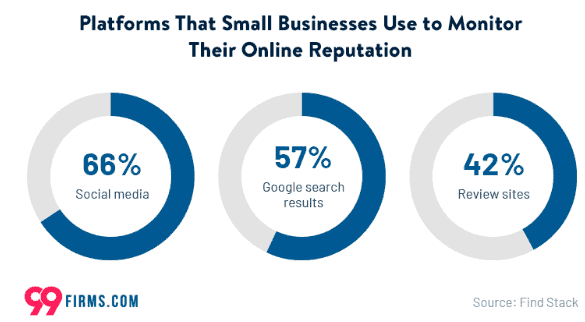 (Reference: 99firms.com)
(Reference: 99firms.com)
- How a company responds to reviews changes the opinion of 56% of customers.
- The way a company answers online reviews can really affect how customers feel about it.
- It can also play a big role in keeping customers. 21% of people aren’t sure if a response changes their opinion, and 23% say it doesn’t make a difference.
- More than half of customers want a reply to their review within one week.
- 3% of customers expect businesses to respond to their feedback within a week.
- This is important not just for the person who left the review but also for future customers.
- 45% of consumers are more likely to visit a business that responds to negative reviews.
- Products with reviews see 3.5 times higher conversion rates.
- If a business wants to get the most from online reviews, they shouldn’t just rely on other sites.
- Adding reviews directly to product pages can significantly boost sales. In fact, products with reviews on the page generate 4.5 times more Revenue Per Visitor (RPV).
Product Review Statistics
- 97% of B2B clients trust testimonials and peer recommendations the most.
- Product reviews for expensive items can boost conversion rates by 380%.
- Consumers who engage with reviews spend 3% more on their purchases.
- Improving star ratings from 3 to 5 can increase Google clicks by 25%.
- Google Business listings see a 15%-20% increase in traffic when they have at least 10 reviews.
- Using customer testimonials regularly can increase sales by 62%.
- Websites with testimonials get 45% more traffic compared to those without.
- 41% of customers think reviews are important when choosing a local business.
- Online Review Statistics stated that almost 65% of people trust a product more when the reviews include images or videos from other users.
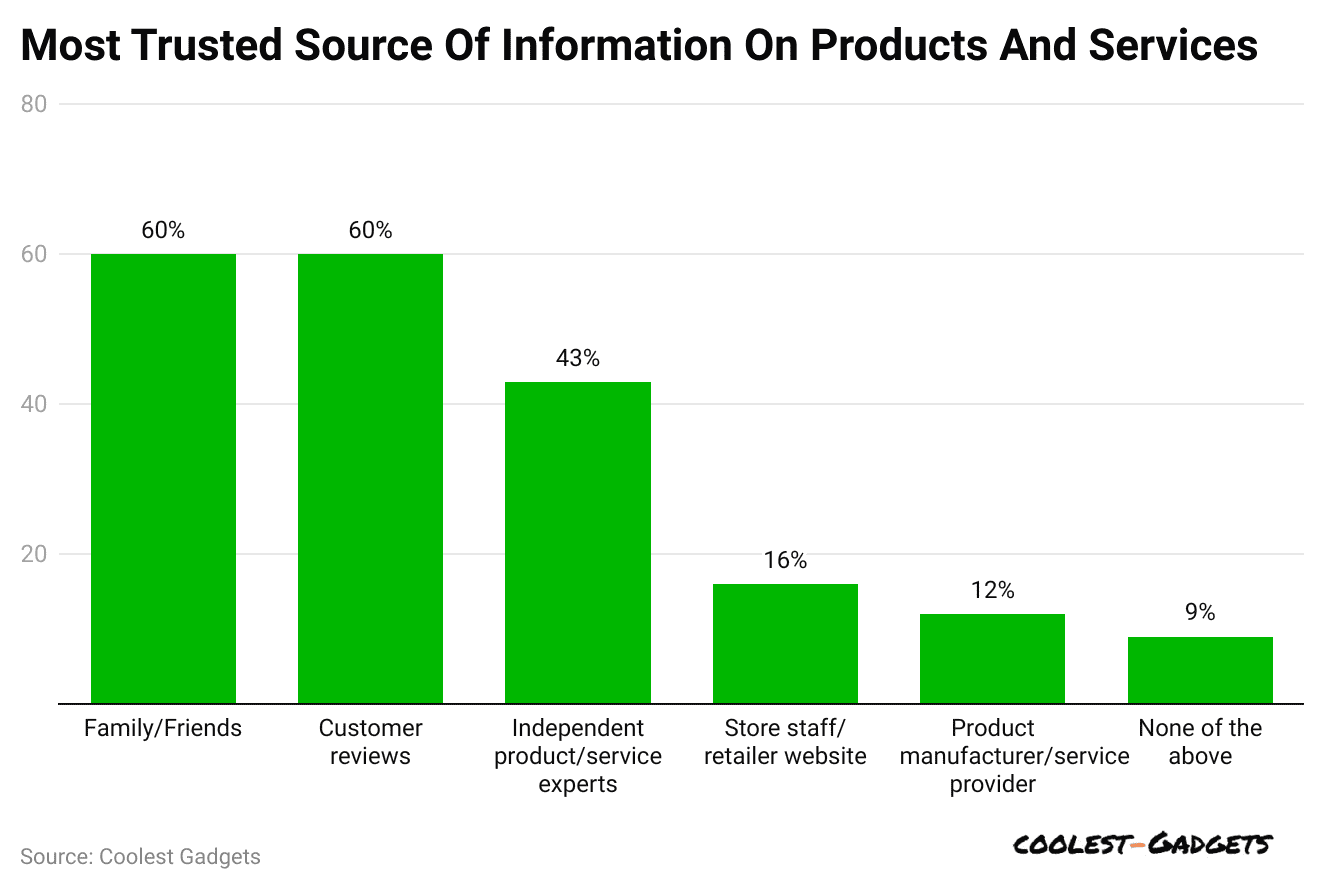 (Reference: 99firms.com)
(Reference: 99firms.com)
- 74% of people would be more likely to contact a business if the landing page has reviews.
- 78% of business leaders say that consumer opinion is the most important for a company’s brand health.
- 81% of people have written a review at least four times in the past year, while 20% never have.
- 85% of people would leave a one-star review if they disliked the company’s staff.
- 90% of shoppers say positive reviews influence their buying decisions, while 86% say negative reviews do the same.
- 97% of business owners think managing their online reputation is essential.
- Conversion rates for cheaper products increase by 190% with reviews and 380% for more expensive products.
- 93% of people say online reviews affect their buying choices.
- 12% of customers would write a review if they had a good experience and saw a sign asking them to, while 36% would if asked by email.
- 58% of customers are more likely to do business with a company that has positive ratings.
- 73% of people trust a local business more if it has good reviews.
- 6% of shoppers check Google reviews before visiting a company’s website.
- People aged 18-34 trust online reviews as much as personal recommendations (91%).
- 83% of customers trust a company if it has user reviews on its landing page.
- Products with at least five reviews are 270% more likely to be purchased than those with no reviews.
- 41% of Americans think reviews are one of the most important factors when choosing a local business.
- 56% of people said their opinion of a company changed based on the company’s response to reviews.
- Online Review Statistics stated that almost 63% of customers search for reviews on Google before visiting a company’s website.
- 72% of consumers find businesses using Google reviews, and 67% of local businesses get 4-star ratings or higher.
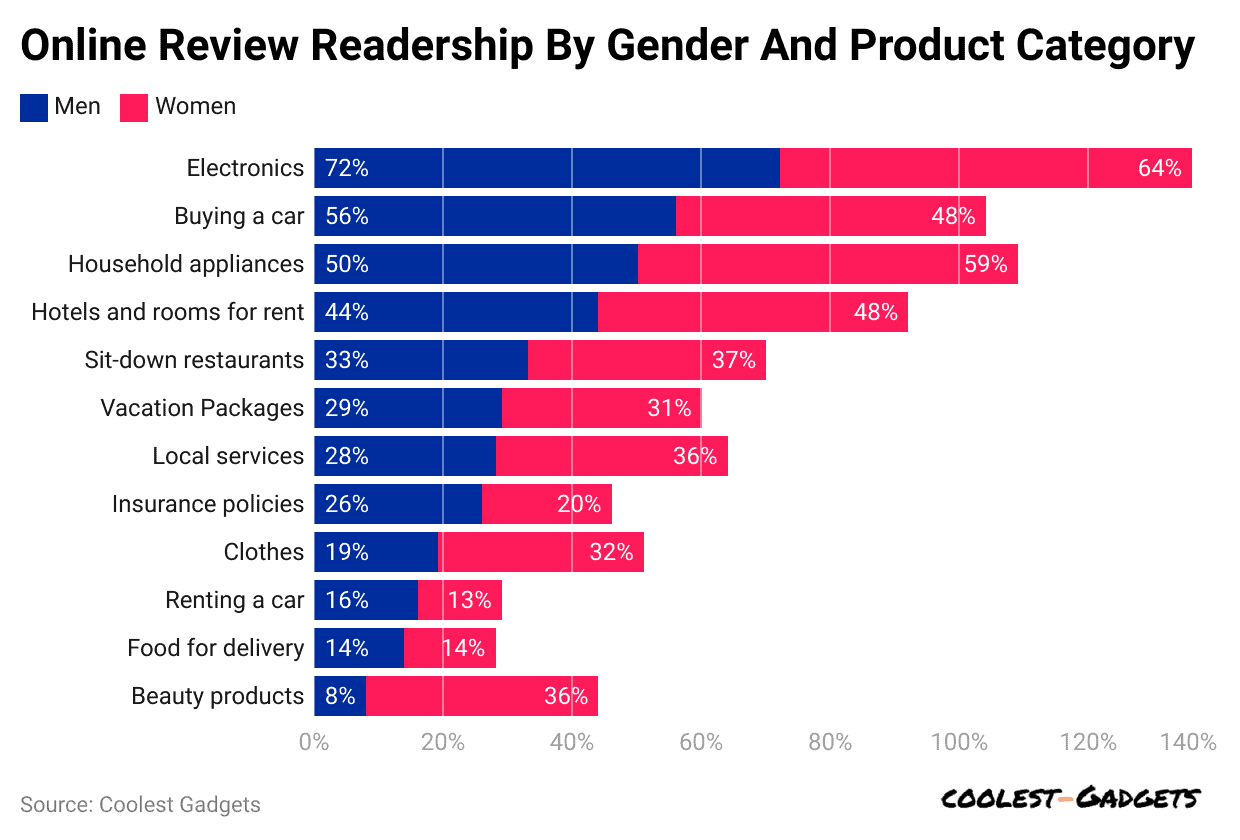 (Reference: 99firms.com)
(Reference: 99firms.com)
- 83% of people believe reviews must be current and relevant to influence buying decisions.
- 60% of shoppers always research a product online before making a large purchase.
- 39% of consumers over 55 trust online reviews as much as personal recommendations.
- 80% of consumers trust ratings above four stars the most.
- 56% of buyers leave negative reviews because the product/service was poor, but they also leave positive reviews if satisfied.
- 22% of consumers left reviews during the pandemic to support local businesses.
- 9% of people are willing to do business with a company with 1-2 star ratings.
- 38% of customers want a 4-star rating or higher before considering a business.
- 57% of U.S. consumers find online reviews very helpful when making buying decisions.
- 67% of consumers avoid businesses that don’t follow proper health and safety guidelines, based on reviews.
- The chance of losing a customer increases to 59.2% if three negative reviews show up in a search.
- 80% of consumers use smartphones to read reviews, compare prices, and find store locations.
- Facebook reviews have a slight influence on e-commerce, but Twitter reviews increase sales by 6.46%.
- A 3.7-star rating can boost conversion rates by 120%.
- Verified reviews have a 15% higher chance of resulting in a purchase.
- Online Review Statistics stated that nearly 80% of reviews come from follow-up emails asking customers for feedback.
- A company that responds to at least 25% of reviews earns 35% more income.
- Tweets with photos get 18% more clicks than tweets without them.
- This version maintains the original meaning while simplifying the language and structure.
Conclusion
No matter how hard you work to improve your products and services, customer reviews can either help or hurt your business. The Online Review Statistics about online reviews show how much influence they have. It’s important to use them to your advantage and increase sales. If you don’t, negative reviews can cause long-term damage to your brand. So, always respond to the reviews you get, and don’t ignore any negative feedback.
Sources
FAQ.
A BrightLocal survey showed that 84% of people trust online reviews as much as recommendations from friends or family. Good reviews can significantly raise a business’s sales and improve customer loyalty.
Some business owners have found that reviews older than 90 days are sometimes removed. Although Google doesn’t have an official rule about deleting old reviews, the age of a review might affect whether it stays up or gets removed.

Joseph D'Souza started Coolest Gadgets in 2005 to share his love for tech gadgets. It has since become a popular tech blog, famous for detailed gadget's reviews and companies statistics. Joseph is committed to providing clear, well-researched content, making tech easy to understand for everyone. Coolest Gadgets is a trusted source for tech news, loved by both tech fans and beginners.



